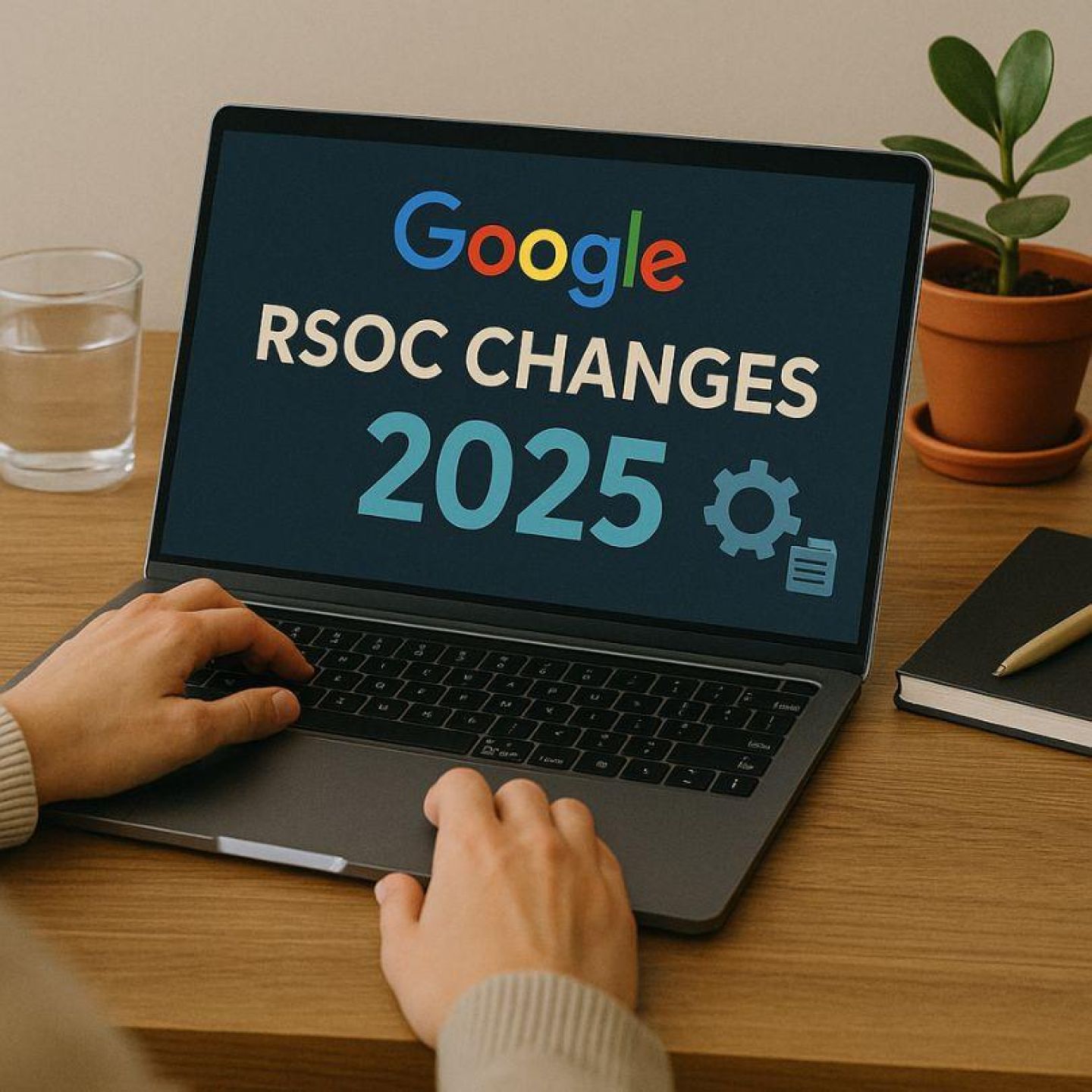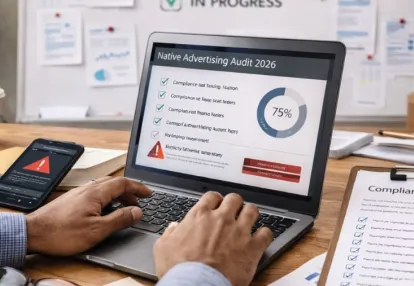
Наши инструменты отслеживают миллионы рекламных кампаний в форматах native, push, pop и TikTok.
НачатьФункция Related Search on Content (RSOC) от Google стала ключевым элементом монетизации поиска для издателей, использующих кампании AdSense для поиска. Этот мощный инструмент позволяет отображать релевантные поисковые предложения непосредственно в вашем контенте, создавая дополнительные источники дохода и одновременно улучшая пользовательский опыт благодаря контекстным поискам.
Ситуация кардинально меняется с комплексным обновлением политики RSOC от Google, которое вступает в силу 25 августа 2025 года. Обновление вводит фундаментальные изменения в порядке доступа издателей к расширенным функциям RSOC и поддержания этих функций, а также строгую систему соблюдения требований, которая напрямую повлияет на вашу возможность масштабирования и оптимизации кампаний.
Издатели, полагающиеся на RSOC для генерации дохода, сталкиваются с важными решениями. Новая политика устанавливает систему из трех предупреждений, регулирующую доступ к ограниченно доступным функциям (RAFs) — расширенным возможностям, отличающим базовую реализацию от высокоэффективных и масштабируемых кампаний.
В этой статье раскрываются ключевые изменения, которые вам необходимо знать: от механики новой системы предупреждений до стратегий соблюдения требований, защищающих ваш доступ к этим ценным функциям. Вы узнаете, как следовать обновлённым правилам, избегать распространённых нарушений и сохранять расширенные возможности, обеспечивающие успех RSOC в 2025 году и далее.
RSOC (Related Search on Content) — это эффективный инструмент заработка, который показывает релевантные поисковые предложения непосредственно в контенте вашего сайта. Эта функция отлично работает с кампаниями AdSense для поиска и позволяет понять, что именно ищут пользователи, когда взаимодействуют с вашим контентом, но не находят нужное им.
Система анализирует содержимое вашей страницы и предлагает пользователям связанные поисковые запросы, которые могут приносить дополнительный доход за счёт кликов по рекламным объявлениям. Вы можете размещать блоки RSOC на стратегически важных местах сайта, создавая естественные точки взаимодействия, где пользователи могут захотеть узнать смежные темы. Кроме того, использование нативной рекламы может дополнительно усилить эти точки, обеспечивая более целевые и эффективные размещения рекламы.
Функции с ограниченным доступом (RAF) — это расширенные возможности, которые отличают базовую реализацию RSOC от оптимизации уровня предприятий. Эти функции раскрывают истинный потенциал масштабирования ваших RSOC-кампаний за счёт расширенного управления и настройки.
RAF включают в себя несколько ключевых возможностей:
Эти возможности позволяют создавать сложные поисковые сценарии, соответствующие вашей стратегии контента, и при этом максимально увеличивать доход.
Обновление политики RSOC 2025 кардинально меняет способ, которым издатели получают доступ к расширенным функциям в рамках экосистемы монетизации поиска Google. Наиболее значительное изменение касается требований доступа на основе соответствия нормам, которые напрямую связывают статус вашей учётной записи с доступностью RAF.
Google отменил предыдущую модель открытого доступа к RAF, заменив её системой контроля доступа на основе соответствия требованиям. Теперь статус соответствия вашей учётной записи определяет, сможете ли вы использовать расширенные функции, такие как несколько поисковых блоков, параметры пользовательского оформления или расширенные возможности отчётности. Этот статус отображается непосредственно в вашей панели AdSense, обеспечивая оперативный контроль за вашей квалификацией.
Процесс активации RAF стал более структурированным и контролируемым:
Эти изменения в Google RSOC создают многоуровневую систему, в которой издатели, соблюдающие правила, получают конкурентные преимущества благодаря расширенным функциям, а у тех, кто нарушает правила, функциональность ограничивается. Модель новых функций и ограничений означает, что для сохранения доступа к инструментам оптимизации дохода необходимо постоянно соблюдать правила.
Теперь возможность масштабирования кампаний RSOC полностью зависит от поддержания безупречной истории соблюдения политик, вследствие чего контроль за соответствием становится важной бизнес-практиккой, а не просто дополнительным условием.
Новая система нарушений Google — это значительное изменение подхода к обеспечению соблюдения их политик. Вводится поэтапная модель применения санкций, которая будет действовать в течение двух лет. Это означает, что вместо немедленных штрафов за нарушения, Google теперь будет применять последствия постепенно, в течение определённого времени.
Система нарушений функционирует по схеме, отслеживающей правонарушения на протяжении 24-месячного периода. Каждое нарушение или «нарушение» сопровождается конкретными последствиями и временными рамками. Ниже приведено описание работы системы:
Когда аккаунт получает первое нарушение, он переходит в статус пробации сроком на 90 дней. В течение этого периода аккаунт по-прежнему имеет доступ к определённым функциям и инструментам (так называемый доступ к RAF). Однако, если в период пробации произойдёт дополнительное нарушение, доступ к RAF будет немедленно отозван.
Если аккаунт получает второе нарушение, его статус меняется на «Ограниченный» на 90 дней. Это означает, что в течение этого периода доступ ко всем функциям RAF будет полностью потерян. Важно отметить, что очередное нарушение в это время приведёт к постоянному отзыву привилегий RAF.
Третье нарушение влечёт за собой самые серьёзные последствия — постоянную утрату всех привилегий RAF. После этого нет возможности восстановить расширенные функции или повторно получить к ним доступ.
Система нарушений учитывает два разных типа нарушений, которые по-разному влияют на начисление нарушений:
Важно, чтобы создатели контента и рекламодатели понимали эти типы нарушений и их возможное влияние на свои аккаунты. Группа по обеспечению соответствия RSOC постоянно отслеживает эти нарушения в течение двухлетнего периода.
Одним из ключевых аспектов при работе в новой системе нарушений является то, что нарушения накапливаются независимо от того, когда именно они произошли в течение 24-месячного периода. Это означает, что даже если нарушение было совершено год назад, оно всё равно может повлиять на текущее количество ваших нарушений.
Для сохранения доступа к RAF и избежания штрафов крайне важно постоянно соблюдать правила Google. Это включает регулярную проверку и обновление ваших методов в соответствии с их рекомендациями, а также незамедлительное устранение любых возникающих проблем или нарушений.
Будучи проактивными в вопросах соблюдения требований и понимая последствия новой системы из трёх нарушений, вы сможете лучше ориентироваться в правилах Google и защитить свой аккаунт от возможных санкций.
Понимание нарушений правил AdSense, влекущих за собой предупреждения, помогает вам сохранить доступ к RAF. Google строго соблюдает стандарты, касающиеся проблем соответствия RSOC, которые могут быстро привести к серьезным последствиям для вашей учетной записи.
Эти нарушения являются наиболее частыми причинами предупреждений:
Эти нарушения создают дополнительные риски несоответствия:
Эти нарушения могут повлечь предупреждения из-за внутренних проблем:
Вам необходимо постоянно отслеживать эти нарушения качества трафика, поскольку существующие проблемы на 25 августа немедленно превратятся в предупреждения в рамках новой системы.
Потеря эффектов доступа к RAF создает серьезные операционные ограничения, которые в корне снижают вашу возможность оптимизировать кампании RSOC. Издатели без доступа к RAF сталкиваются со следующими критическими ограничениями:
Эти ограничения оптимизации RSOC напрямую влияют на результативность кампаний. Вы теряете гибкость в тестировании нескольких поисковых блоков, экспериментировании с различными комбинациями терминов или соответствии визуального стиля вашего сайта. Невозможность кастомизации оформления означает, что ваши поисковые блоки могут не сочетаться с дизайном сайта, что потенциально снижает вовлеченность пользователей.
Влияние на доход от AdSense выходит за рамки текущих поступлений. Без доступа к RAF вы не сможете эффективно масштабировать кампании или применять продвинутые стратегии монетизации. Издатели, ранее полагавшиеся на несколько поисковых блоков на странице, столкнутся со значительным падением трафика и доходов. Ограничение на использование только генерируемых Google терминов лишает вас возможности использовать высокодоходные ключевые слова от партнеров, которые зачастую повышают конверсию.
Ваше конкурентное преимущество в экосистеме RSOC существенно снижается при работе в рамках этих базовых ограничений.
Соблюдение требований RSOC требует немедленных действий от издателей до 25 августа 2025 года. Вам необходимо провести всесторонний аудит текущей реализации RSOC, чтобы выявить и устранить любые существующие нарушения, которые могут привести к санкциям при вступлении новой политики в силу.
Начните с проверки своего Центра политик AdSense на наличие невыполненных нарушений или предупреждений. Систематически устраните эти проблемы:
Руководство для издателей по соблюдению AdSense выходит за рамки первоначальной очистки. Вы обязаны внедрить постоянные практики, которые будут поддерживать хорошую репутацию вашей учетной записи:
Подготовка к изменениям политики Google требует проактивного мониторинга через Центр политик AdSense. Назначьте регулярные проверки статуса учетной записи, отчеты о нарушениях и показатели соответствия. Вам следует немедленно устранять любые выявленные проблемы, вместо того чтобы ждать официальных уведомлений, поскольку оперативное устранение демонстрирует вашу приверженность успешному взаимодействию с обновлением политики RSOC в Google и системой наказаний в 2025 году.
Понимание системы процесса обжалования в AdSense требует осознания важного различия: вы не можете напрямую оспаривать нарушения, но можете оспорить лежащие в их основе нарушения политик, которые к ним привели. Такой подход означает, что вы должны сосредоточить свои усилия на оспаривании конкретного нарушения через Центр политик Google, а не пытаться убрать само нарушение.
Центр политик служит основным инструментом для управления нарушениями политик и понимания решений по применению правил. При подаче апелляции на нарушение необходимо предоставить четкую документацию, демонстрирующую, как вы устранили проблему или почему нарушение было применено ошибочно. Для апелляций в Центре политик требуются конкретные доказательства, а не общие пояснения.
Регулярно посещайте Центр политик, чтобы:
Когда ваш аккаунт переходит в статус испытательного срока или ограничения, применение защитных стратегий становится необходимым. Вы должны ежедневно проверять все источники трафика, обеспечивая полную прозрачность того, как пользователи попадают на ваши блоки RSOC. Немедленно удаляйте любые сомнительные каналы трафика, даже если раньше они приносили доход.
Внимательно следите за размещением вашего контента в эти критические периоды. Убедитесь, что блоки RSOC появляются только на страницах с содержательным, соответствующим контентом, и их количество никогда не превышает число отображаемых связанных результатов поиска. Зафиксируйте эти меры соблюдения, чтобы продемонстрировать свою активную ответственность в случае появления дополнительных нарушений.
Регулярный мониторинг Центра политик помогает выявить потенциальные проблемы до того, как они перерастут в нарушения, и сохранить ваш доступ к ценным функциям RAF.
Соблюдение правил — это ключ к успеху в постоянно меняющемся мире стратегии Google AdSense 2025 года. Оно напрямую влияет на ваш потенциал дохода и масштабируемость кампаний, определяя доступ к функциям с ограниченным доступом. Издатели с чистыми аккаунтами получат выгоду от множества поисковых блоков, расширенных возможностей настройки и передовых функций отчетности, что приведет к более эффективной монетизации.
Будущее монетизации RSOC принадлежит издателям, которые проактивно управляют соблюдением правил. Рассматривайте Центр политик как свою главную панель управления, регулярно проверяйте наличие нарушений и устраняйте проблемы до того, как они превратятся в предупреждения. Такой дисциплинированный подход защищает ваш доступ к передовым функциям, которые отличают успешных издателей от тех, кто сталкивается с трудностями в выполнении базовых функций.
Ориентироваться в обновлении политики RSOC и системе предупреждений Google 2025 года требует стратегического мышления и гибкости. Соблюдение правил нельзя рассматривать как одноразовую задачу; оно требует постоянного внимания и совершенствования ваших методов. Издатели, которые вложат усилия в понимание этих новых правил и создание надежных процессов соблюдения, будут процветать, в то время как другие столкнутся с ограничениями, тормозящими их рост.
Ваш успех зависит от своевременного получения информации, решительных действий и соблюдения высочайших стандартов соответствия политике.
Получайте лучшие конверсионные лендинги каждую неделю на свою почту.
Обязательно к прочтению
Dan Smith
7 миндек. 21, 2025
Инструкция
Нативная реклама способна делать нечто большее, чем просто увеличивать количество кликов — она может укреплять долгосрочную лояльность к бренду. Узнайте, как использовать искреннее сторителлинг, стратегическое размещение и таргетирование аудитории, чтобы усилить доверие в кампаниях под конец года. Выясните, как ненавязчивые сообщения, основанные на ценностях, удерживают клиентов после праздников. Идеально подходит для маркетологов, стремящихся превратить сезонных покупателей в преданных сторонников бренда.
Marcus Chen
7 миндек. 15, 2025
Недавно обновлено
Нативная реклама может определить успех или неудачу вашей маркетинговой кампании в праздничный сезон. Узнайте, как оценить недавние кампании и выявить то, что сработало — или что оказалось неэффективным — в нативной рекламе. Освойте ключевые тактики оптимизации, чтобы повысить вовлеченность, укрепить доверие аудитории и увеличить конверсии в будущих промоакциях. Идеально подходит для маркетологов, стремящихся усовершенствовать свои рекламные стратегии после новогодних хлопот.
Elena Morales
7 миндек. 1, 2025




